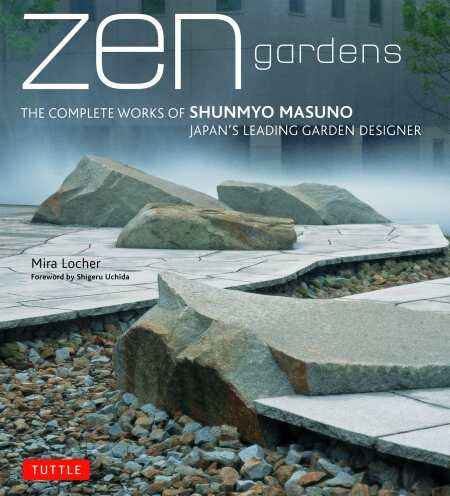Zen Gardens
The Complete Works of Shunmyo Masuno, Japan's Leading Garden Designer
Even just a quick riffle through the pages of Zen Gardens: The Complete Works of Shunmyo Masuno can cause a healthy lowering of one’s blood pressure. Seeing such tranquil spaces in our generally chaotic world offers an escape to an oasis of serenity, or what Shunmyo Masuno himself calls an “unmoving truth.” Masuno has gone through much training to create his understated scenes of beauty, including intense study as a Zen Buddhist priest along with years of garden design apprenticeship. Author Mira Locher, an architect and professor based in the United States and Japan, is an excellent guide to this tour of Masuno’s work, explaining key elements of Zen and Japanese design and the complexity of such calm splendor.
In the case of each example, the individual spaces and settings are integral to what Masuno designs. The surrounding landscape, the wishes of the client, and the history of the project are highly important, as are the seven characteristics of Zen arts. There are dry gardens or karesansui, which use gravel and rock yet still imply a sense of movement, and then there are lush wet gardens with flowing currents or calm, carp-filled pools.
The book’s over four hundred color photos and drawings are truly splendid, from the Buddha water basin and octagonal wood soaking tub of the Suifūso Guesthouse with its view of the sea, to the Tokyo Metropolitan University hilltop Wind Theater sculpture. Masuno’s garden for the Canadian Embassy in Tokyo harmonizes East and West, featuring a waterfall to represent the Atlantic and Niagara Falls, granite for the Canadian Rockies, and a pond to symbolize the Pacific Ocean. Masuno’s featured works outside Japan, including public commissions and private residences, are also detailed and emphasize his international reputation.
Among the most compelling of Masuno’s designs is at the Hofu City Crematorium. Locher notes that cremation is common in Japan, with family and friends of the deceased traditionally attending the actual ceremony. Masuno’s Garden of Eternity is composed of six sectional gardens, each representing a stage of memorial and passage. Grief will ideally turn to peace as the final garden is reached, and as the person who has died begins his or her journey to the afterlife.
Zen Gardens: The Complete Works of Shunmyo Masuno is surely best approached just as one would enter a Masuno garden—with a sense of quiet, curious wonder at how man and nature can sometimes meet as one.
Reviewed by
Meg Nola
Disclosure: This article is not an endorsement, but a review. The publisher of this book provided free copies of the book to have their book reviewed by a professional reviewer. No fee was paid by the publisher for this review. Foreword Reviews only recommends books that we love. Foreword Magazine, Inc. is disclosing this in accordance with the Federal Trade Commission’s 16 CFR, Part 255.

